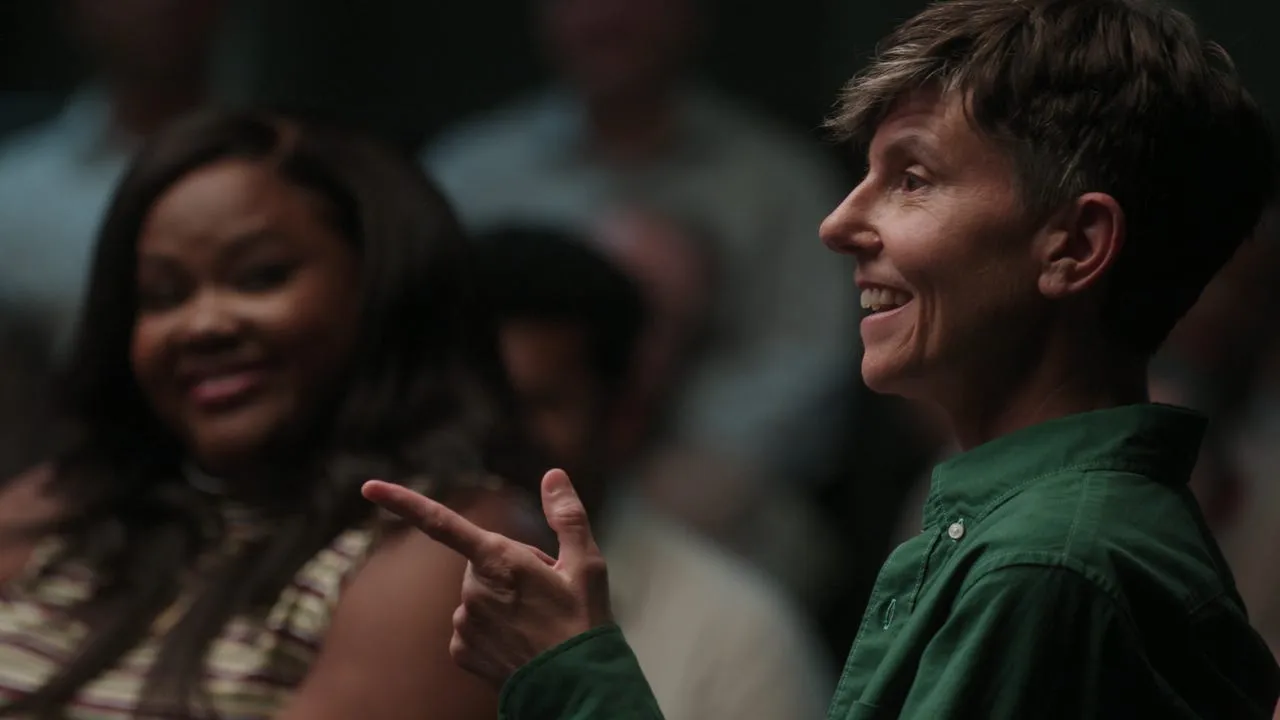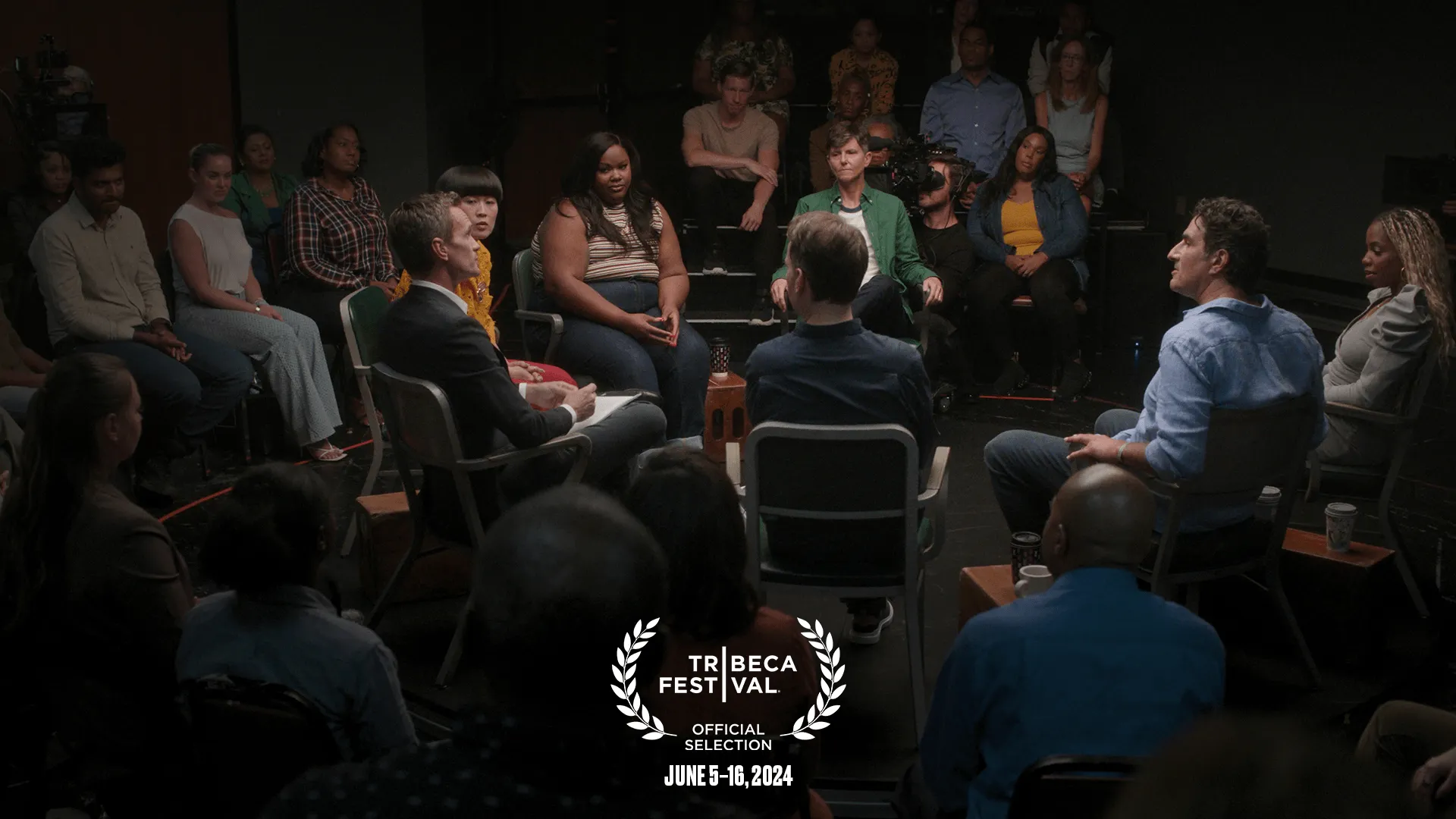Within Group Therapy’s opening moments, clips from top comedians reveal the struggles often beneath humor’s surface. Statistics on isolation and anguish roll as George Carlin matter-of-factly states society’s failures supporting mental wellness.
We then meet the film’s subjects: Tig Notaro opens up after battling cancer and grief. Gary Gulman discusses depression leading to suicidal thoughts and institutionalization, though medication now helps. Mike Birbiglia speaks of nearly three decades of therapy and loss impacting his craft. Nicole Byer and London Hughes face industry racism and body insecurity.
Director Neil Berkeley brilliantly pairs frank interviews with these risk-takers and others with Neil Patrick Harris’s group therapy, moderated with empathy. Laughter remains, but now shines light on shadows many brave souls face, creating joy for others.
We watch personal discovery and authenticity battles, themes resonating as performers showcase how life influences acts. Through it all, we glimpse challenges when carving identities within prescribed roles, whether by audiences or business realities.
This examination proves an eye-opener. By humanizing celebrities and spotlighting strains rarely voiced, Group Therapy starts discussions vital to creative fields and beyond. Its subjects deserve praise for candor, often life-changing for viewers, and for reminding that under comedy frequently lies perseverance against troubles many privately confront.
The Weaving of Group Therapy
Director Neil Berkeley pulled from an eclectic assortment of filmic styles to craft Group Therapy. He brings us into casual backstage conversations between duos, during which vulnerabilities surface organically. Yet the meat remains in several focused areas.
Around a circled gathering shine headlines like Tig Notaro, Gary Gulman, and others. Here under Neil Patrick Harris’s guidance, companions support each insightful sharing, laughter mingling with personal revelations. We glimpse intimacies impossible elsewhere.
Separately, singles sit answering unseen questions, pulling emotional triggers with care. Deeper understanding comes through these intimate exchanges, allowing space for contemplation without distraction.
Ever-changing vistas like these maintain energy, as nimble editing by Billy McMillin weaves each thread together seamlessly. Though diverse, none lack substance—all advance awareness in their own manner. Formats ebb and flow like tides, never dissociating audiences from the film’s undercurrents.
While approaches vary, intentions align: to lift veils obscuring industry struggles, bringing realities of mental health to a welcoming light. In Berkeley’s skillful hands, no technique distracts from this goal’s attainment. All work in harmony as comrades within do to cultivate compassion through shared understanding.
Vulnerabilities and Their Voice
The comedians in Group Therapy open a window into diverse personal trials. Gary Gulman recalls depression’s crushing weight, leading once to stand atop a ledge. Therapy and medication now lighten his load, though struggles persist. Nicole Byers lives with ADHD, finding answers after years perplexed by its effects.
Mike Birbiglia explores how three decades of self-analysis aided his journey, yet losing friends to addiction cast long shadows. London Hughes faced society, deeming her skin and figure unacceptable, a pain feeding creative fire. Atsuko Okatsuka’s gift arose from caring for her mother amidst schizophrenia battles, but support seemed a destination beyond her reach.
Notaro battled wonders no one should withstand—breast cancer, fertility loss, her mother’s accidental death—all in a single turn. But through humor’s dark veil came clarity and catharsis. Harris knows fame feeds compulsion as surely as pills, and navigating that insatiable need demands diligence.
Yet for these travelers, comedy wasn’t only a sanctuary. It became a bridge to others questioning life’s unfairness and their place within it. Laughter reminded me that light exists, even in the bleakest shadows, and solidarity’s power to heal.
By baring the deepest scars comedy could not cover, hope emerged that others find solace and strength where they found it. Though struggles continue, joy was borne from channeling life’s detours towards lives improved by authenticity and care, as these artists learned within themselves and aim to teach beyond the spotlight’s reach. Their gifts help sorrow find its voice, as their voices help us end sorrow’s isolating reign.
Navigating Laughter’s Shadows
Within comedy’s realm, striving never halts. Each new audience brings a chance to thrive—or fall to wayside. Especially today, creativity means opening wholly to judgment, with competition fiercer at every turn.
For some, success seemed unlikely from the outset. Nicole and London knew bias meant “being black” according to rules not their own. Their voices faced stifling before finding strength.
All navigated pressure to survive amid fickle tides of favor. Consistency proves elusive when whims change year to year. Meanwhile, the inner critic’s censure stays relentless, hungering for new heights however attained.
Neil notes Hollywood catalyzes this unceasing thirst, with status an ever-receding mirage. Fame feeds the beast while chipping away wellness. Gary knows depression’s grasp and psych wards where none should end up.
They share how constant baring of self leaves scars. Intimacy oils audiences’ wheels, yet extraction of such insights extracts its pound of soul. To mine, absurdity in sorrow risks normalizing pain comedy was meant to transcend.
Yet through it all shines their wish to help others. By lifting veils and cultivating kinship where once isolation held sway, hope emerges that none need face demons alone. Their gifts show struggle’s universal threads and remind that laughter’s healing stems may yet be found.
Revelations and Their Ripple
By confronting ghosts seldom voiced, these talents stir change beyond theater walls. As confidences wash over Group Therapy’s audiences, divisions lessen between those facing fears alone, and those lights illuminate.
Once secrecy cloaked terrors, comics’ life rafts. But wounds festered in shadows, and help seemed for others, not within reach. Now realizations dawn: if heroes so indestructible also weep, then hopes remain no matter darkness. And if laughter springs even from ashes, through shared smiles lies solace.It rises from seeing superheroes bleed. No more do struggles signal defects, but traits uniting all journeys, however peculiar in outline. Fellow pilgrims abound, though unseen, and hands extend worldwide from this film’s small room.
Once these artists spoke alone to millions. Now millions speak with them as kindred, as normalcies fall away and hand extends to hand extends. A ripple widens beyond shores as struggles find shoulders to lighten the load and eyes new purpose awakening from truth’s rays.
Depth perceives depth, and depths cure. There healing flows from honesties courageous, carrying courage to others still shy of light. Such gifts dazzle with mercy, extinguishing no fire but those pain sparks where none fuels but fear itself. These stars lead not down but up, as up leads laughter healing what harms birth.
Their open palms lift shackles from laughter long chained, and ears to aid others in breaking free. All prove that even mountains may laugh and even seas may weep, yet boats bob on while tides ebb and flow. So hope stays risen though wild its course, and souls uplift though heavy the cargo, with mirth as ballast binding fast what fate would tear asunder.
Finding Lightness in Darkness
Though tales within carried weight, these wordsmiths know humor offers buoyancy; nothing else equals. As Tig unveils private agonies, her deadpan hints how facing fear with mirth disarms life’s blows. London hints how poking fun at insecurities robs them of their sting.
Beneath mirth, deeper still, lies laughter’s ability to bind us. By baring sorrows with a wink, these gift-givers invite us into their lives as siblings do, discomfort and ease intertwined like fingers locking in support. We join Gary in recalling what depression drags you under, yet his timing lifts all from that abyss together.
Even Notaro, having endured more than many faces in nightmares’ worst, located inside these horrors laughter keys unlocking survival. Now her gifts spread that power, proving hope springs where none shows. These masters remind us that joy endures though darkness falls, and smiles can resurrect what tears long drowned.
Trauma alters—none knows that more. Yet through their works flows understanding—pain universal, but not alone borne. Their gifts spread that realization like seeds taking root wherever they found purchase. All prove that even mourning’s depths house humor’s pulleys, drawing souls upward on thin laughter lines, no gravity outweighs.
The Laughter’s Lingering Lessons
In opening intimate windows onto challenges rarely unveiled, these stars start discussions too valuable to soon conclude. Group Therapy holds the power to reshape understanding for all encountering its blend of wit and candor.
Comedy aficionados especially will find resonance in glimpses into writing from life’s detours. But broader lessons ring on for all touched by metal wellness’ complications. None withstands alone, as solace emerges through community like buds piercing winter’s last frosts.
This film urges approaching difficult topics with openness, not fear. It calls us to lift each other with empathy, not judgement, as none travels this road exempt from sorrows or instabilities. In guests’ willingness to illuminate shrouded private agonies comes also a reminder: help exists wherever we open hands to take it.
Though lightness pervades its message, Group Therapy’s afterglow lingers heavy with hope—that through laughter shared even in tears, understanding grows that binds all humankind. Its gifts may start conversations whose riches stretch long after final frames, instilling belief that joy endures however heavy life’s refrain.
The Review
Group Therapy
Group Therapy offers an intimate look at the challenges comedians face crafting laughs from life's harder truths. Its candid discussions break stigmas and start conversations on mental wellness that linger long after final credits. While not groundbreaking, the film achieves its aim to educate and bring hope through its stars' willingness to bear vulnerabilities so rarely unveiled.
PROS
- Intimate look at personal journeys and industry struggles of renowned comedians
- Candid discussions challenge stigmas around mental health and start important conversations.
- Features varied formats, including therapy sessions and one-on-one interviews.
- Touches on diversity of challenges, including depression, trauma, racism, and more.
- Humor and compassion show in discussions while still conveying serious topics.
CONS
- Not particularly groundbreaking for fans familiar with comedians' public discussions.
- Formats don't evolve greatly across films, so impact relies on vulnerability alone.
- Could provide deeper analysis of proposed "solutions" to issues




















































Discussion about this post